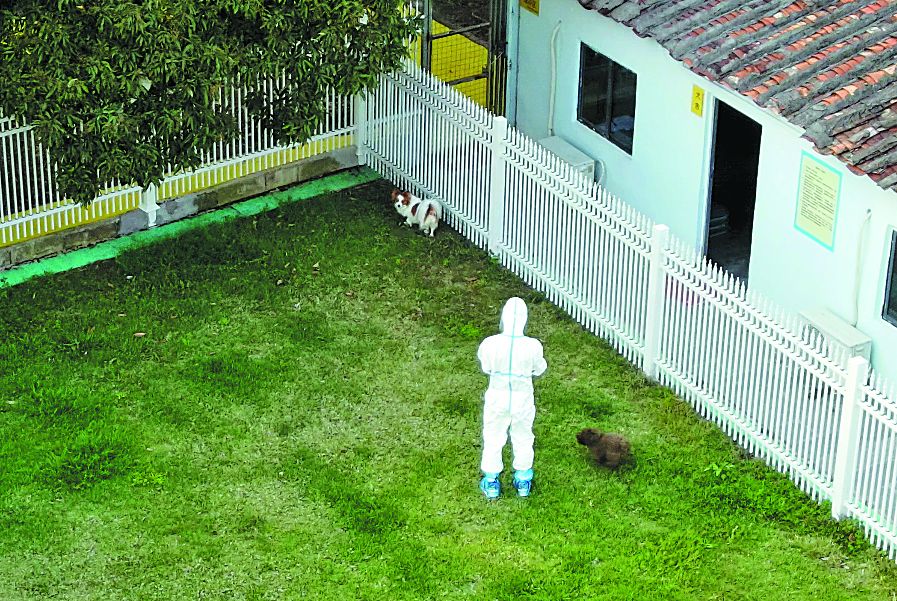source: editor:Wenny

A staff member works at a care center for pets in Guangming district, Shenzhen, Guangdong province. [Photo for China Daily]
Series of measures offer comfort to animals and their owners
Netizens in Shenzhen, Guangdong province, have shared pictures on Sina Weibo of their pets receiving certificates bearing the words "Little heroes against COVID-19".
One of these certificates was awarded to Fu Zai, a British short-hair cat, who spent about 20 days at a pet care center while his owner was undergoing centralized quarantine for COVID-19.
The certificate stated: "Dear Fu Zai, in view of your excellent performance at the pet center, cooperating with inspection, feeding, walking and other tasks, and successfully defeating the pandemic, the organizing committee has decided to award you the title Anti-pandemic Little Hero. This certificate is hereby issued to you and we hope that you will grow up healthy and happy!"
On Thursday, a netizen posted the certificate on Sina Weibo, where it quickly trended, attracting more than 11,000 comments and 276,000 likes.
However, the back of the certificate carried a few words from Fu Zai's carer, who stated, "Your naughtiness really gave us a headache for some time when you first arrived."
On Friday, Shenzhen announced that its first centralized pet care center had been placed in trial operation, offering kenneling services to animal owners undergoing centralized quarantine for COVID-19. Once the center officially opens, it will be able to house a maximum of 300 dogs and cats, while its operation and maintenance will be handled by the city's market supervision and administration bureau.
Friday's announcement quickly resulted in the topic "China's first official makeshift center for pets "trending online. The decision to launch the center was made after similar pet care facilities were set up last month at the Shangsha community in the city's Futian district. These centers proved successful in caring for more than 200 pets, including Fu Zai.
Other cities, including Changsha, capital of Hunan province, and Chengdu, the Sichuan provincial capital, are offering such services for pets as China grapples with a resurgence of COVID-19 cases.
On March 16, the pandemic control command in Futian issued a notice stating that the Shangsha community had been classified as a medium-risk area. Some residents in the community were asked to relocate to centralized quarantine sites for 14 days for their health to be monitored. Making arrangements for pets while their owners were away became a problem.
Some residents volunteered to collate pet owners' requests from social media platforms, handing the requests to community workers. On March 17, the local authorities issued another notice, informing residents that medical workers would visit them to disinfect their animals and take them to centralized care centers.
On the same day, New Ruipeng Pet Healthcare Group was commissioned to provide professional care services for animals.
Kong Debin, a vet from the healthcare group, told Southern Weekly the company quickly formed a team of volunteers and they began work on March 17. A hotline for pet boarding opened that evening and government officials and volunteers held a meeting at which they decided to set up makeshift pet care centers.
Nobody at the meeting had a clear idea of how many pets would need such a service, but it was agreed to ensure the health of each animal and not to let owners in quarantine become more anxious about arrangements for their pets, Kong said.
Construction of the first care center began at about 1 am on March 18 and it was put into use five hours later. Volunteers disinfected the facility twice a day and cleaned cages to maintain a dust-free, sterile environment. A week later, the second center was built close to the first, which was fully occupied.

A pet care center in Shenzhen offers kenneling services to animal owners undergoing centralized quarantine for COVID-19. [Photo for China Daily]
As the COVID-19 situation in the neighborhood stabilized, the two centers closed earlier this month. In addition to cats and dogs, they housed seven hamsters, one rabbit and a duck.
Some cats encountering a new environment became stressed and were reluctant to eat. Kong said that among the 140 cats, more than 60 showed such symptoms. "No one had previous experience in running a makeshift center for pets, but during the whole process we were trying to create good conditions," he said.
For the cats, volunteers used aromatherapy in each container that secreted a hormone to calm the animals. Medication was added to their food to stimulate appetite, and the volunteers also gave the pets snacks, took them to the lawn and used toys to interact with them.
Volunteers registered the name, age, breed, living and eating habits of each animal as well as owners' contact details. They filmed a short video of each pet every day and sent the footage to owners. The volunteers also ensured that the pets were disinfected and dewormed before they arrived and kept records of the animals' cleaning and feeding times every day.
Over the 20 days of stay, Shenzhen's animal disease control center collected 715 samples from the surrounding environment and more than 200 saliva samples from animals. The samples returned negative after being sent for testing.
The entire service was free of charge. Pet owners felt reassured during their quarantine, and the experience was also rewarding for the volunteers. Kong summarized his team's work in a document and forwarded it to the local government.
He said, "During the pandemic, we explored little by little how to disinfect animals, standardize their transfer, operate pet care centers, ensure supplies and personnel protection, and coordinate communication management."
With the recent surge in COVID-19 cases in China, public concerns have been voiced about animals whose owners test positive. Some people fear that pet dogs could be intermediate hosts of the novel coronavirus and spread it to humans.
Bu Zhigao, a researcher at the Chinese Academy of Agricultural Sciences' Harbin Veterinary Research Institute, told Science and Technology Daily that the risk of dogs spreading the virus to humans is extremely low.
His team carried out a substantial amount of research in the early days of outbreaks on the transmission of the virus between different animals and on which pets were more susceptible to the novel coronavirus. The findings, published online in the journal Science in April 2020, showed that cats and ferrets were highly susceptible, whereas dogs, pigs, chickens and ducks were not.
"Judging from the laboratory data and the situation now, we can tell that dogs can be exposed to infection but are still relatively less susceptible compared with cats and ferrets, and dogs also have a low viral load," he said. Bu added that pet dogs have been found to be infected in Hong Kong, but there has been no transmission of the virus between dogs and humans.
He said that even if dogs are infected, the symptoms are not very obvious and test results can turn negative after a week or two of quarantine. However, his current research data are based on tests carried out on earlier strains of the virus. He said that as it has mutated several times, the updated infectivity and pathogenicity of the mutants require further studies and monitoring.
He added that for the treatment of pets as part of pandemic control measures, local conditions need to be considered when courses of action are drafted.
For pet dogs in close contact with positive cases, Bu suggested the animals be placed in quarantine for a period, the environment disinfected, and multiple nucleic acid or antigen tests be conducted using oral, nasal and fecal swabs.
"Current testing methods for humans are also applicable to dogs. This is a more scientific and rational approach to manage the risk," he added.